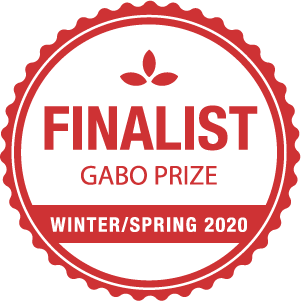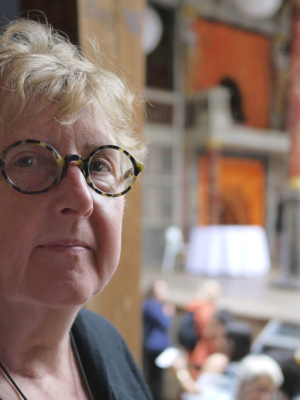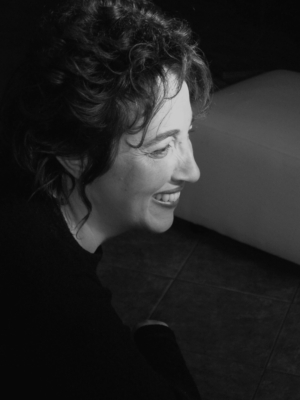The Alabaster Cup
I
A crack is stained with the fog that begins on the plain.
The green of the curved jade grants transparency but also denies it:
leaves of thick dye, aroma that descends
clamoring at this somewhat empty start, condemned
from dye to aroma, peach that coats.
The line blushes and smiles, asks the blue bruise
for its sweetness, cardinal bruise of jealousy
Rose in the window of fear blue dye of the mauve
jellyfish, doesn’t dwell where it accuses and goes to mourn.
Banging its head against the glass the broken bruise
opens the roses the peak of the arm the curve that joy
wouldn’t want. It is late, they must abandon everything with blood
between the teeth, with the thick aroma of leaves damp
from the fog. Beating a retreat from mourning
on the wings of that immense stuffed albatross
hanging from the roof of the tomb.
Gilded vault of crickets, to brandish in the fire’s light,
a hand made of silk skirts. Dreaming of chrysanthemums
when lifting the cloak that is the fog, there is translucency of
light with water, the fruit of the dawn
A cut on the delicate forehead, somber, axis of evanescence.
Oblivious.
III
Columns of condensed water that will later become rock.
Sweet hive that brings anxiety to the swarm.
A crushing constancy is what turns the head,
turns the wheel, and a god without a double recovers his innocence.
Jeweled clocks from Italy, almond-colored liquor.
Mother will come with yellow grapes, they will bring confections
and they will give you that milk from the goats they raised.
On this shore the rocking fans itself.
On this shore it rains.
Neither kisses nor sweets nor candies.
Those whispering words in the poisoned ear
Those constellations that travel the blue lightning that was yesterday
when there was no time
Journey of one who does not return man on the mule who brings the pledge of life:
He is going to jump when nobody expects.
He is going to hide in that dark, obscene language
of death.
IV
A vast prairie crossed the sky’s silhouette and
painted another blue on the verbal plain’s
horizon.
You returned with the radio in your pocket
whistling a tune that was not
in style.
You came back from the unknown edge of silence like dragging
fish from a sea at dawn.
And it was all there, on the dirty table
fish, oblivion, alcohol, badly painted nails.
Oblivion.
V
When you close your eyes, it is green again.
It was like that, in the distant spring,
the first green of
summer
when the trees yearn for silence
that looks deserted.
Your back toward a new start, this constancy
that begins and transforms;
the will
tossed on a filthy straw pallet
grows pale. You do not lift a finger without the
reflection that illuminates desired zeal, pierced
between other signs of pride.
On the final edge of that room
a reverberation, gray, dotted with indecipherable
varnish boiling a decomposed liquor,
speech of a secret world.
VI
Floating, between shoals a wind
sweeps without forgiveness or relief
in the fugitive lands
in a dryness that was once sea
crystals, infinite prisms awaiting
reverberation.
It is not sweetness or chained smoke
that approaches heaven.
It is not perfect, petal over petal
to give off from the crown to the iridescent relevant fruit
an ambiguous liquor, a fragrant foam.
Deformed bodies that the eye distorts
and sees as blue, with veins, with morbid roots
with rot at the bottom of the canal.
You see the half-digested food
the nails of martyrdom, the bruise of the sky,
the crimson rose of a torture from every direction.
Contemplated.
You will burn at the stake.
You will drown in the half-light.
You ascend this way again and again
again cardinal
again lilac
again a beaten purple.
From the bloody battle they can see just a few campfires extinguished
many bodies facedown
lifeless.
The wind pulls at these enormous tumbleweeds
those bouquets of dreams of the other
enameled pieces of divine annunciation
in a celestial dome.
Ways to express what is contained
in a stretched and exposed shining surface.
VIII
To close your eyes to the final night
rising horizontal
from peace to the sea, to midday.
It gets angry and rises from burial mound to celestial clouds
with boldness, with penitent forgiveness
You smile elegantly, it’s only one day
a spring a river.
It is a mark of heroin on the shinbone
it is a stench that rises
from the cloudy portion that boils.
How horizontal, how cruel, how white
how light
Back turned, the roaring melody neither stops nor cradles
You drown, give beauty to the eyes, light
to what cannot be named.
It tramples with ease the nourishment, the lesson
that no one learned.
The naked girl from this circus
observes the slightly peeling blue window
and leans over that vain podium
to see the sea, the other side of joy.
The final shadow will close my eyes
and carry me to the white day.
–Francisco de Quevedo
X
In the stained glass window the jewels fly over
static and distracting
eyeless. Velvet.
It is the enraged face that sticks out
hiding under the red cloth, perfuming
what you believe possible.
An insect produces it suddenly,
moistens it from edge to edge,
fills it with crumbs,
spoils everything.
It is no longer clean or pure or perfect,
no longer smiles as if still.
It is no longer jasmine no longer alabaster
Jade, sky’s trembling blue lapis lazuli.
A coffin without flowers, a mistake
left without a dead body
turbulence without color to attack
Empty guilt of all content,
Look at the nest
Look at the nest that cries
There, obedience.
![]()
LA COPA DE ALABASTRO
I
Una fisura se tiñe con la niebla que inicia en la llanura.
Verde del jade oblicuo que da la transparencia que es negada:
hojas de espeso tinte, aroma que desciende
fragor de ese principio como vacuo, condena
desde el tinte al aroma, durazno que recubre.
Sonrisa la línea y va sonriendo, pide de su dulzor
al cardenal azul, cardenalicio moretón de celo
Rosa en la ventana del espanto el azul tinte
de morada medusa, no mora donde acusa y va de luto.
Golpeando la cabeza contra el vidrio el roto cardenal
abre de rosas la cumbre del brazo, la curva que la dicha no
quisiera. Es tarde, deben abandonarlo todo con sangre entre
los dientes, con el espeso aroma de las hojas humeantes
de la niebla. Batirse en retirada a duelo,
sobre las alas de ese inmenso albatros disecado
colgando desde el techo del sepulcro.
Dorada bóveda de grillos, blandir en el trasluz del fuego
la mano, hecha de enaguas. Soñar de crisantemos
Al levantar el manto que es la niebla, está la espejada de
luz con manantial, el fruto de la aurora
Tajo en la frente mórbida, sombría, eje de evanescencia
Distraído.
III
Columnas de un agua condensada que después se hará roca.
Dulce colmena que trae hasta el enjambre la zozobra.
Una machacada constancia es la que vuelve la cabeza,
gira una rueda, y un dios sin doble recobra la inocencia.
Cuentas de reloj de Italia, licor con el color de las almendras.
Va a venir mamá con uvas amarillas, van a traer confites
van a darte esa leche de las cabras que acuna.
En esta orilla se abanica el vaivén.
En esta orilla llueve.
Ni besos ni dulces ni confites.
Esas palabras susurros al envenenado oído
Esas constelaciones que recorre el azul del rayo que fue ayer
que no hubo tiempo
Camino del que no vuelve arriero trayendo la prenda de la vida:
Va a saltar cuando nadie lo espere.
Se va a esconder en esa lengua oscura, obscena
de la muerte.
IV
Sobre el perfil del cielo recorría una vasta pradera que
pintaba de azul otro color sobre un horizonte de planicie
verbal.
Volvía con la radio en el bolsillo
silbando una tonada que no
estaba a la moda.
Volvía desde el ignoto borde del silencio como arrastrando
peces de un mar en madrugada.
Y estaba todo ahí, sobre la mesa sucia
los peces, el olvido, el alcohol, las mal pintadas uñas.
El Olvido.
V
Cuando cierra los ojos reverdece
Ya fue así, en la lejana primavera
verdor primero de un
verano
que los árboles añoran sobre silencio
que parece desierto.
De espalda a un recomienzo, esa constancia
que se inicia y se transforma;
la voluntad
echada sobre un jergón inmundo
palidece. No levanta el tendón sin el
reflejo que ilumine ese celo buscado, perforado
entre otros atributos del orgullo.
En el borde final de aquella estancia
un reverbero, gris, salpicado de esmalte
indescifrable bulle un descompuesto licor,
un habla de trasmundo.
VI
Flotando, entre cardúmenes que arrastra
un viento sin perdón ni alivio
gira en los terrenos fugitivos
en una sequedad que antes fue mar
cristales, infinitos prismas pendientes
de reverberación.
No es el dulzor ni el humo encadenado
lo que acerca al cielo.
No es lo perfecto, pétalo sobre pétalo
desprende desde la corona al irisado fruto pertinente
un licor con ambages, una espuma olorosa.
Cuerpos deformes que el ojo distorsiona
y ve azul, de venas, de mórbidas raíces
de podredumbre al fondo del canal.
Ve la comida a medio digerir
los clavos del martirio, moretón del cielo
la rosa cárdena de un suplicio desde todos los puntos
Contemplado.
Se quemará en la hoguera.
Se ahogará en la penumbra.
Asciende así una vez tras otra
de vuelta cardenal
de vuelta lila
de vuelta violeta castigado.
De la cruenta batalla se ven apenas unas fogatas apagadas
un montón de cuerpos boca abajo
exánimes.
El viento arrastra esos enormes erizos
esos ramos con sueños de los otros
esmaltados trozos de anunciación divina
de cúpula celeste.
Maneras de expresar lo contenido
en superficie bruñida estirada y expuesta.
VIII
Cerrar los ojos a la postrera noche
horizontal asciende
desde la paz al mar, al meridiano día.
Se irrita y se levanta del túmulo al cúmulo celeste
en osadía, en perdón penitente.
Sonríe con pulcritud, es sólo un día
un manantial un río.
Es una marca de heroína en la tibia
es un hedor que sube
desde esa parte turbia que lo cuece.
Qué horizontal, qué cruel, qué blanca
qué ligera
De espaldas, la rugiente melodía ni detiene ni acuna
Ahoga, da belleza a los ojos, lumbre
a lo que no se nombra.
Arrolla con soltura el alimento, la lección
que no se aprendió nadie.
La muchacha desnuda de este circo
observa la ventana de azul un poco despintada
y se recuesta sobre ese vano podio
a ver el mar, la contracara de la dicha.
Cerrar podrá mis ojos la postrera
sombra que me llevara el blanco día.
–Francisco de Quevedo
X
En la vidriera sobrevuela la pedrería
que estática y sin ojo
desmerece. El terciopelo.
Es el rostro que asoma enardecido
esconde bajo el trapo rubor, perfume
lo que cree que es posible.
Un insecto de pronto lo produce
lo humedece de borde a borde
lo llena con migajas
lo deteriora todo.
Ya no es limpio ni puro ni perfecto
ni siquiera sonríe como quieto.
Ya no es jazmín ya no alabastro
Jade, temblor del cielo lapislázuli.
Un féretro sin flores, un descuido
que se quedó sin muerto
turbulencia sin color que atacar
Vacía la culpa de todo contenido,
mira el nidal
mira el nidal que llora
Esa, obediencia.
TRANSLATORS’ STATEMENT
The poems here are from Un mar en madrugada (A Sea at Dawn), by the Uruguayan poet Silvia Guerra, which was published in 2018 by Hilos Editora, Buenos Aires, Argentina.
As translators, we have both dedicated ourselves to the sharing of work by poets—particularly women—from South America’s smallest Spanish-speaking country. Starting with early poets such as Delmira Agustini (1886-1914), Uruguay has a long tradition of poetry by women that continues in an unbroken line, generation to generation, down to the present. It is a body of work we have been working hard to make more visible outside Uruguay, with Jeannine translating the work of Marosa di Giorgio (The History of Violets, published by Ugly Duckling Presse in 2010, and I Remember Nightfall, published by Ugly Duckling Presse in 2017) and Jesse Lee translating the poetry of Circe Maia (The Invisible Bridge, University of Pittsburgh Press, 2016) and Idea Vilariño (Love Poems, forthcoming from University of Pittsburgh Press in 2020). Uruguayans are well aware of this tradition. When Jesse Lee edited the anthology América invertida: An Anthology of Emerging Uruguayan Poets (University of New Mexico Press, 2015), she asked the young poets to include in their bios the names of the Uruguayan poets who influenced them. The anthology is nearly half women poets and they all included women poets in their answers. The poet whose name came up time and again was Silvia Guerra.
Guerra has dedicated herself to building and maintaining a space for Uruguayan poetry, particularly for poetry by women. From 2009 to 2011, she was the coeditor of the seminal Uruguayan poetry press La Flauta Mágica. She has long served on the board of the Nancy Bacelo Foundation, organizing and hosting countless readings, discussions, and encounters, and she is now on the Mario Benedetti Foundation board as well. But the young poets love her, not for this work, but for her poetry, which engages deeply with what it means to be Uruguayan and to be a woman in Uruguay.
Guerra was raised on the coast in Maldonado and her poems draw many of their images from its beaches and the countryside, not in a simple, narrative way, but rather as symbols of the exploration of her own consciousness. Indeed, her poems are a form of continual meditation which play continually with the transformation and transmutation of words, and through all her work runs a hunger for meaning, for a reason to exist. “Something calls, persists, intermittent / blind. I must flee blazing toward a dark door that will hide / me. Shaking like others before me / in this same place, here, Hidden,” she asserts in a perplexingly exquisite poem entitled “Of Duration I Will Die, Chosen.”
About Guerra’s work, the critic María Rosa Olivera Williams has stated, “[Guerra’s] writing, aware that it enters language from a female body exiled from language, does not permit a gentle, joyful flight; instead, the author must explore the contours of that body again and again through words to the point of fragmentation, decomposition; when that body has turned into memory, it becomes the platform from which she observes and speaks. In this way, poetry becomes knowledge.”
We suggest that Guerra’s writing—which is always challenging—is in itself a translation. As Virginia Woolf and the other early twentieth-century modernists attempted to translate the flow of human consciousness into their writing, as Hélène Cixous urged women to transform their subjectivity into language for écriture féminine, Guerra shatters clichés, breaks through grammatical and stylistic conventions, and digs as deeply as she can into the shifting sands of language to seek the truths that lie beneath. But as it turns out, these truths are just as amorphous and fleeting; images or emotions appear before the reader like an exquisite piece of driftwood before being swept back to sea.
Just as we still get frustrated when we look through anthologies of Latin American literature and find that male authors dominate the pages, we have both long considered it problematic that only a few of Guerra’s poems had been translated into English. A year ago, when Silvia Guerra said she would be in the US in October to read at Notre Dame University, we promised to translate enough poems so that she could give bilingual readings. Then we arranged for Silvia Guerra to read at Indiana University, DePauw University, Washington and Lee University, and at the University of Wisconsin-Madison. She also gave an invited reading at the Library of Congress in Washington, DC. The response to Guerra’s work was overwhelming. The students in all the universities and the audience at the Library of Congress fell in love with her poetry. We have promised Guerra to go on with translating her work and to complete a translation of Un mar en madrugada.
So, working in collaboration, we have just finished translating the book and we are delighted to have these poems in Lunch Ticket. Silvia is a formidable representative of the next generation in Uruguay’s formidable unbroken chain of women writers, and her marvelous poetry deserves to be known and read widely.
Jesse Lee Kercheval is a fiction writer and poet, and the author of America that island off the coast of France (Tupelo Press, 2019), winner of the Dorset Prize. Her translations include The Invisible Bridge/ El Puente Invisible: Selected Poems of Circe Maia (University of Pittsburgh Press) for which she was awarded an NEA Fellowship in Translation. She is the Zona Gale Professor of Poetry at the University of Wisconsin—Madison.
Jeannine M. Pitas is the author of the poetry collection Things Seen and Unseen. She has translated collections of poetry by the Uruguayan poet Marosa di Giorgio, The History of Violets and I Remember Night Fall, both published by Ugly Duckling Presse. Her latest translation, Echo of the Park by the Argentinian poet Romina Freschi, was just published by Eulalia Books. She lives in Iowa and teaches at the University of Dubuque.
Silvia Guerra (1961, Maldonado, Uruguay) is an Uruguayan poet, critic, and editor whose books include Un mar en madrugado (2018), Pulso (2011), Estampas de un tapiz (2006), Nada de nadie (2001), La sombra de la azucena, (2000), Replicantes Astrales (1993), Idea de la aventura (1990), De la arena nace el agua (1986), and Fuera del relato (2007), a fictionalized biography of Lautréamont. She is a member of the executive boards of both the Mario Benedetti Foundation and the Nancy Bacelo Foundation. In 2012, she was awarded the Morosoli Prize in Poetry for her career.








